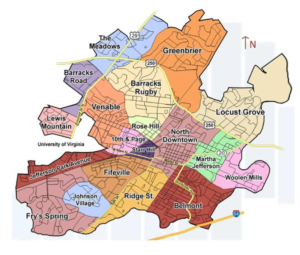
by James C. Sherlock
In the relationship between Charlottesville and the University of Virginia, very bad things have happened to Charlottesville and continue to do so.
I have developed a working thesis on that relationship.
The city is at the mercy of the University by virtue of the latter’s wealth, influence, and power in Charlottesville elections.
It is, driven by University community voters, the bluest voting district in the Commonwealth.
Unfailingly progressive Charlottesville city council, school board and Commonwealth’s Attorney candidates are elected by the dominant votes of the University, its employees and its students.
Charlottesville City Schools (CCS) are to a large degree creatures of the University.
Many CCS teachers have their bachelors and/or advanced degrees from UVa’s School of Education and Human Development. Many University ed school students do their student teaching in Charlottesville.
Every progressive educational policy and virtually every experiment the University’s ed school can dream up are visited on those students. The University’s ed school Research Centers and Labs find the proximity convenient and a pliant school board welcoming.
The University can’t bear to leave anything in CCS alone.
As Charlottesville High School faces the aftermath of rising rates of violence at the school and three canceled days of school due to alack of personnel, teachers at the University and other community groups have assisted in the school’s response. Faculty from the University’s School of Education and Human Development were present at development sessions with Charlottesville High School teachers aiming to address underlying issues….
“Dr. Stephanie Rowley, dean of the University’s Education School, said faculty from Education’s counselor education and educational psychology programs were particularly involved with the efforts because of the relevance of their expertise.”
There is no record of their being invited.
“Lack of personnel”. The teachers walked out because of runaway violence.
The University “lent a hand”.
“In light of the University’s recent push to bolster its impact in Charlottesville, some members of the University who specialize in education attended the teacher work day meetings at Charlottesville High School.”
Seriously. To “bolster (the University’s) impact in Charlottesville”.
For Black children in CCS schools, that influence, long-running and well-meaning though it has been, has turned out to have been a disaster unparalleled in the Commonwealth.
Voting. Charlottesville’s elected city council and school board align philosophically and directly with the University. Joseph Platania, the elected Commonwealth’s Attorney, is a restorative justice icon.
That makes sense, really, because a very large slice of the voters who elect them are academic and medical staff, faculty and students at UVa.
The University has almost 10,000 employees at the Charlottesville campus. It has over 17,000 students there. All are of voting age.
The total population of Charlottesville was estimated at 45,373 in 2022. A total of 38,250 of those, swelled by university students claiming residency, were of voting age. More UVa students than you can imagine vote in Charlottesville. The census bureau asks only where they live the majority of the year.
The University uses everything but cattle prods to get them to the local polls.
Influence. Charlottesville, were it to resist UVa’s interests, would be in a cage match with a much more powerful and wealthier competitor. The cage is the ten square miles of the city.
As the University has expanded and continues to do so, the city cannot. Irresistible force meets inelastic object.
With the University community’s demand for residential housing within walking/bicycle distance of the Lawn continually increasing faster than supply, and no undeveloped land in Charlottesville, the zoning decisions are tough.
Zoning changes generally bow to the University’s interests. As a recent editorial in The Cavalier Daily explained, the University is not a good neighbor.
Charlottesville reversion to town status. Someone once wrote that things that can’t go on forever will stop.
Charlottesville as a city is untenable. I will recommend that Charlottesville strongly consider reversion to town status within Albemarle County. Such a move is all upside for the city.
Albemarle County, with a population last year estimated at 114,534, half again the median household income of Charlottesville, and huge swaths of undeveloped land, is in an excellent position to make it work far better than the reversions Virginia has seen up to this point.
Under Virginia laws, Charlottesville, with a Census Bureau estimated population of 45,373, can revert without county permission.
Next, we will look next at the issues resulting in Black student failures to learn in more detail.
We will also look a lot closer at Charlottesville City Schools and the relationship between those schools and the University’s School of Education and Human Development (UVaEd).
It has produced unmatched failure for the very Black children whom both claim, and intend, to champion.
A major update was entered on Dec. 18, 2023 to reflect updates in the book version of this series. Some of the text originally here was moved to part 2.

Leave a Reply
You must be logged in to post a comment.